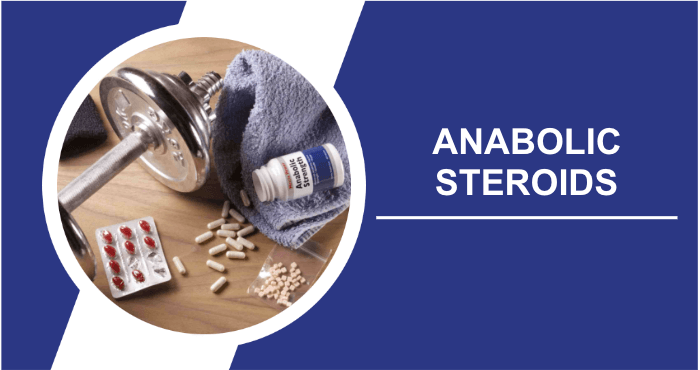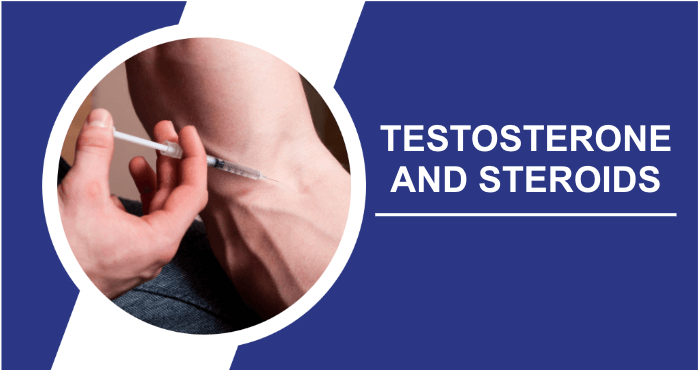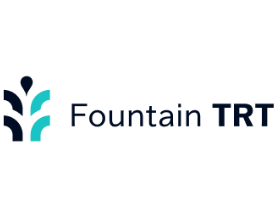Over the past decade, men have become increasingly aware of the critical role that healthy testosterone levels play in their overall well-being, leading to a surge in the popularity of testosterone-enhancing products and testosterone replacement therapy (TRT). This surge in demand has proven beneficial to individuals struggling with issues such as unfavorable body composition, diminished libido, and reduced vitality.
Considering its myriad benefits, ranging from increasing bone and muscle mass to improving mental clarity, one might assume that testosterone should enjoy an impeccable reputation. However, there are common misconceptions surrounding testosterone that have cast a shadow over the concept of T-boosters and replacement therapy.
It is often associated with the term “steroid,” and the mere mention of that term conjures up images of athletes using performance-enhancing substances to excel in sports, or individuals using anabolic steroids to increase muscle mass and strength.
However, testosterone, whether in the form of boosters or replacement therapy, does not fit this stereotype, and the desired outcomes for those with low T differ significantly from those commonly associated with steroid use. So what exactly is testosterone? Is testosterone classified as a steroid? If so, what are the implications of its use? We are on the verge of clarifying what testosterone is and its central role in men’s health. Let’s get into the details!
Is Testosterone A Steroid? Testosterone is not a steroid but is often classified as an androgenic steroid hormone. The key difference lies in their chemical structures and functions. Testosterone is a natural hormone produced primarily in the testes (in males) and in smaller amounts in the ovaries (in females).
It plays a crucial role in muscle development, bone health, and sexual characteristics. On the other hand, steroids, such as corticosteroids or anabolic steroids, are synthetic compounds used for various medical purposes and muscle-building. While both impact the body, they have distinct origins, functions, and uses.
What Are Hormones In General?
Hormones are like the body’s behind-the-scenes messengers, quietly orchestrating the symphony of our physiological functions. They’re like the conductors of a complex orchestra, regulating everything from mood and metabolism to growth and reproduction.
These tiny chemical messengers are produced by various glands in our bodies and travel through the bloodstream to target cells and tissues, where they trigger specific responses. It’s as if they were passing secret notes to keep the body in harmony, making sure all the players play their parts perfectly. Without hormones, our bodies would be like a chaotic orchestra without a conductor, struggling to create the beautiful music of life.
What Is Testosterone?
Testosterone, the primary male sex hormone, is synthesized in the testes and is responsible for the development of distinctive male characteristics such as facial hair and a deep voice. It’s interesting to note that women also have testosterone in their bodies, albeit at lower levels. In females, testosterone is produced in the ovaries and contributes to increased muscle and bone strength, as well as supporting sexual desire.
Before puberty, males and females have relatively similar levels of testosterone. However, during puberty, testosterone levels in males experience a significant increase, while the increase in females is more modest. In men, the minimum healthy testosterone level is about 300 nanograms per deciliter (ng/dL), but it can peak at 1080 ng/dL between the ages of 18 and 20 and gradually decline over the years without external intervention.
In contrast, women typically maintain much lower testosterone levels, ranging from only 15 to 70 ng/dL. Even the lowest testosterone levels in men are more than four times higher than in women. In summary, although testosterone is classified as a steroid due to its molecular structure, it plays a crucial and pivotal role in overall health. Physiologically, steroids are compounds with a carbon skeleton consisting of four fused rings with a total of 17 carbons.
What Is The Function Of Testosterone?
Testosterone belongs to the category of hormones known as androgens, a group of steroid hormones that interact with androgen receptors in the body to facilitate various processes, including protein synthesis. During puberty, testosterone levels increase significantly, especially in males.
Testosterone plays a central role in the initiation and progression of male puberty, as well as in the development and maintenance of male-specific characteristics. Its primary function revolves around stimulating and promoting distinctive traits in the male body. Some notable examples of these characteristics include:
- Broadening of the shoulders
- Increase in muscle mass
- Penis enlargement
- Growth of body hair
- Deepening of the voice
- Increased sexual desire
- Accurate testosterone measurement
- Appointment with a doctor
- Cream and injection options
- Price: $35 – $199
- Rating ⭐⭐⭐⭐⭐
Other Than Testosterone, What Can I Do For My Hormone Balance?
Maintaining hormone balance involves more than just focusing on testosterone. A holistic approach to hormone health includes lifestyle choices such as regular exercise, a balanced, nutritious diet, and managing stress through relaxation techniques or mindfulness. Prioritizing quality sleep also plays a critical role, as sleep is when our bodies repair and regulate hormone production.
In addition, avoiding harmful habits such as excessive alcohol consumption and smoking can contribute to better hormonal balance. Remember, it’s about taking care of your body as a whole, creating a harmonious environment where all your hormones can work in sync to support your overall well-being.
Is Testosterone A Steroid?
Yes, testosterone is indeed a steroid. As mentioned above, a steroid is defined by its chemical structure, which includes four interconnected carbon rings. This classification includes several natural hormones, such as estrogen, the female sex hormone. Thus, testosterone falls under the category of steroids. However, it is important to clarify that testosterone, as it occurs naturally in the body, is not an illegal anabolic steroid. More on this topic will follow.
Is Testosterone Anabolic And What Does That Mean?
The term “anabolic” means a substance or process that promotes tissue growth, including the development of muscle tissue, as opposed to “catabolic,” which means tissue breakdown. Therefore, testosterone is undeniably anabolic. Since testosterone is a steroid, it can be classified as an anabolic steroid.
It should be noted, however, that in everyday conversation the term “anabolic steroid” typically refers to illegal steroids (which testosterone is not) and the abuse of anabolic steroids. This distinction can sometimes lead to confusion, and further clarification of the nomenclature is provided below.
What Exactly Is An Anabolic Steroid?

Now that we’ve established what testosterone is, it’s imperative that we have a clear definition of steroids. In the realm of fitness terminology abuse, “steroid” undoubtedly ranks high on the list. Among the general population, the term “steroids” or “anabolic steroids” is often used to encompass any illicit substance used by steroid users to enhance athletic performance and physique.
While this loose terminology may be sufficient for casual conversation, it does not accurately capture the essence of steroids, anabolic steroids, or their legitimate health-related use. To begin with, the term “steroid” refers to specific compounds that possess a particular molecular structure. As previously mentioned, it refers to compounds with a carbon skeleton consisting of four interconnected carbon rings, for a total of 17 carbon atoms.
Now, the term “anabolic” refers to a process or compound that facilitates the development of bodily tissues. Consequently, compounds such as HGH and testosterone are classified as anabolic due to their role in promoting growth. This is where the confusion often arises. One of the issues at hand is the widespread misuse of these terms to the point where incorrect usage has become commonplace.
Therefore, it is important to distinguish between the precise medical definitions and the way these terms are used colloquially. In the medical context, testosterone qualifies as an anabolic steroid because it possesses steroid characteristics and promotes muscle growth. However, when individuals generally refer to “anabolic steroids,” they are usually referring to illegal substances used for the purpose of improving body composition, muscle development, and performance.
This category includes compounds that, when analyzed through the lens of medical definition, do not truly fit the steroid classification. For example, HGH is often classified as an anabolic steroid. However, while it has anabolic properties, it is not a steroid; rather, it is a peptide hormone. Erythropoietin (EPO), a hormone that stimulates the production of red blood cells, is also often grouped under the umbrella of “anabolic steroids”.
It should also be noted that testosterone occurs naturally, but can also be produced synthetically. Its synthetic form may be used as a medical therapy or may be obtained illicitly. Thus, its classification (whether by medical definition or colloquial interpretation) depends on its source and intended use.
Is Testosterone A Steroid Or A Hormone?
This prompts the question: Is testosterone a steroid or a hormone? While you eagerly await the answer, let’s pause for a moment because the question itself is not quite correct. What we should really be asking is: Is testosterone an anabolic steroid or a hormone? The answer depends on its source.
When it is naturally synthesized in the body, testosterone is considered a steroid hormone. Conversely, when it’s synthetically produced outside the body for medicinal purposes, it falls into the category of an anabolic steroid. However, it’s important to note that being classified as an anabolic steroid does not automatically make testosterone therapy illegal.
What Sports Can Increase Testosterone Levels?
Engaging in certain sports and physical activities can indeed boost testosterone levels. Resistance training, such as weightlifting or bodyweight exercises, can have a significant impact on testosterone production. The challenging, muscle-building workouts signal your body to release more of this hormone. Likewise, high-intensity interval training (HIIT) can also be effective in raising testosterone temporarily.
Competitive sports like sprinting, wrestling, and martial arts, which demand short bursts of intense effort, can offer similar benefits. However, it’s important to remember that consistency matters; maintaining an active lifestyle and combining these activities with a well-balanced diet and adequate sleep is key to sustaining healthy testosterone levels over the long term.
What Happens When Testosterone Levels Are Low?
As mentioned above, testosterone levels peak between the ages of 18 and 20¹, typically after the onset of puberty when the body is flooded with hormones. However, you may want to enjoy those optimal T levels during this time, because once you pass the age of 18 and enter your early 20s, your body’s natural testosterone production will begin to decline. A decline in testosterone can occur through two primary mechanisms: as an inherent aspect of the aging process and as a result of lifestyle choices.
With regard to aging, there is little that can be done to prevent it. As we age, our bodies inevitably begin to break down, and this is simply the natural course of life. Unfortunately, many men attribute their low testosterone levels to “aging,” when in fact it is their lifestyle choices that have the most significant impact on their T levels. Failure to maintain healthy testosterone levels can lead to several health risks, some of which are quite serious. These may include:
- Reduced libido
- Erectile dysfunction
- Problems maintaining muscle mass and strength
- Decreased muscle mass and strength
- Weight gain
- Fatigue and low energy
- Depression and other mood changes
How Can Testosterone Levels Be Increased?
As previously mentioned, today’s men are experiencing lower testosterone levels primarily due to lifestyle choices and environmental factors. Some common contributors to this decline include:
- Smoking
- Excessive alcohol consumption
- Sedentary lifestyle
- Obesity
- Poor dietary habits
- Lack of sleep
- Use of narcotics (prescription pain relievers)
- Medications for hair loss
If these factors are responsible for your declining testosterone levels, it makes sense to reverse these behaviors to restore testosterone levels to a healthy range. For example, a 2014 study found that testosterone levels in sedentary men increased significantly after a 12-week exercise program. Similarly, research has shown that men who were overweight or obese experienced the greatest improvements in testosterone levels following diet and exercise interventions.
Similar positive effects have been seen with improvements in sleep quality and smoking cessation. Therefore, some key lifestyle changes to support your T levels include establishing an effective exercise routine, sticking to a weight-loss meal plan, eliminating harmful habits such as smoking and excessive alcohol consumption, and prioritizing quality sleep. In addition to lifestyle changes, you can also increase testosterone levels by using testosterone boosters and TRT or the best online TRT in our opinion, Fountain TRT.
Testosterone boosters are supplements that naturally increase testosterone levels using vitamins, minerals, and herbs, and they can be obtained without a prescription. TRT, on the other hand, is a medical treatment in which low doses of synthetic testosterone are administered to individuals with low testosterone levels, typically on a weekly basis, with the goal of increasing overall testosterone levels.
- Accurate testosterone measurement
- Appointment with a doctor
- Cream and injection options
- Price: $35 – $199
- Rating ⭐⭐⭐⭐⭐
Are Testosteron Boosters Steroids?
It’s important to clarify that testosterone boosters are different from anabolic steroids and do not fall into the same category. The highest quality testosterone boosters contain only vitamins, herbs, and minerals that can increase testosterone levels but do not exceed your body’s natural range. Additionally, testosterone boosters are available over the counter because they contain only natural ingredients. No prescription is required for testosterone boosters.
Steroids Vs. Testosterone – Key Differences
Let’s review the key differences between testosterone and steroids:
- Nature: Testosterone is a naturally occurring compound, whereas anabolic steroids are synthetic in nature.
- Purpose: Anabolic steroids are designed to mimic the effects of testosterone.
- Testosterone levels: Natural testosterone levels in the body are naturally limited to a basic range, while anabolic steroids can raise these levels significantly beyond that range.
- Impact on hormones: Anabolic steroids can suppress the body’s natural testosterone production, thereby affecting overall hormone levels.
Who Should Consider Boosting Their Testosterone Levels?
Now that we’ve clarified the nature of testosterone and the reasons for supplementation, the question arises: Who should consider increasing their testosterone levels? Individuals 25 years of age or older who have identified low testosterone (T) levels should consider increasing their T levels, either through the use of testosterone boosters or testosterone replacement therapy (TRT). If you suspect you have low T, it is advisable to first consult a healthcare professional and undergo testing to assess your testosterone levels.
What Are The Most Effective Ways To Increase Testosterone?
Once you’ve confirmed that you have low T, you can decide whether to start with a testosterone booster, which involves taking a pill to naturally increase testosterone levels, or to talk to your doctor about starting TRT. In addition to considering one of these approaches, it is important to make lifestyle changes. This includes eliminating harmful habits, such as smoking, and improving sleep quality, while adopting positive habits, such as regular exercise, a balanced diet, and making sure you get adequate and restorative sleep.
Frequently Asked Questions
What is testosterone?
Testosterone is a naturally occurring steroid hormone synthesized within the testes (in males) and ovaries (in females), playing a pivotal role in the development of secondary sexual characteristics.
Is testosterone a form of steroid?
Indeed, testosterone falls into the category of steroids due to its structural resemblance to other organic compounds recognized as steroids.
In what ways does natural testosterone contrast with synthetic anabolic steroids?
Natural testosterone is endogenously produced by the human body, serving various vital functions, while synthetic anabolic steroids are artificially engineered substances, frequently employed for performance enhancement and carrying potential adverse effects.
What are the potential hazards associated with the utilization of synthetic anabolic steroids?
The misuse of synthetic anabolic steroids can result in significant health hazards, encompassing cardiovascular complications, liver impairment, and psychological challenges.
Is the usage of testosterone for performance enhancement both lawful and secure?
No, employing testosterone or other steroids for performance enhancement purposes outside of legitimate medical treatment is against the law and poses substantial health risks. It is imperative to resort to such substances solely under medical supervision when medically warranted.
Conclusion
In conclusion, the debate surrounding testosterone and steroids can be clouded by the negative stigma attached to illegal steroid use. Words are often used pejoratively, leading to confusion. In fact, testosterone is a naturally synthesized steroid that serves as the primary male sex hormone. It can also be manufactured artificially and administered under proper medical supervision by a qualified healthcare provider.
The crucial point to remember here is that the term “steroids” has suffered from a tarnished reputation due to the abuse of illegal steroids and issues such as “roid rage”. However, when discussing the natural production in our bodies or its legitimate medical use, it should not carry a negative connotation.
Sources
- American Urological Association. “Testosterone Deficiency Guideline.” Read more
- Birthi, P., Nagar, V. R., Nickerson, R., & Sloan, P. A. (2015). “Hypogonadism associated with long-term opioid therapy: A systematic review.” Journal of opioid management. Read more
- Wittert G. (2014). “The relationship between sleep disorders and testosterone.” Current opinion in endocrinology, diabetes, and obesity. Read more
- Sharma, R., Harlev, A., Agarwal, A., & Esteves, S. C. (2016). “Cigarette Smoking and Semen Quality: A New Meta-analysis Examining the Effect of the 2010 World Health Organization Laboratory Methods for the Examination of Human Semen.” European urology. Read more

